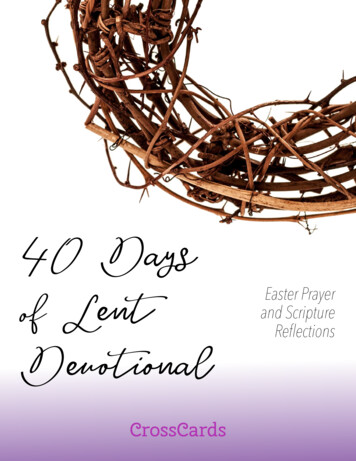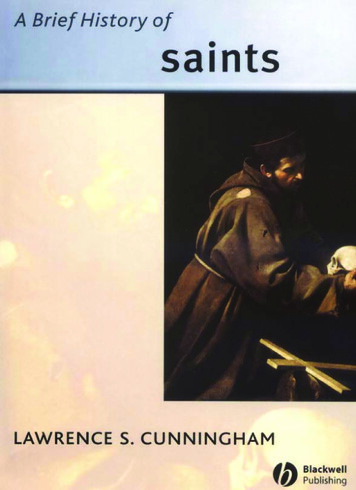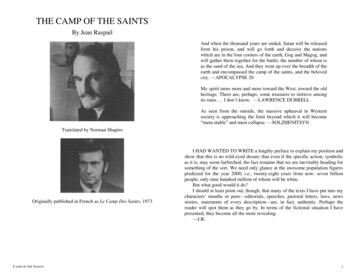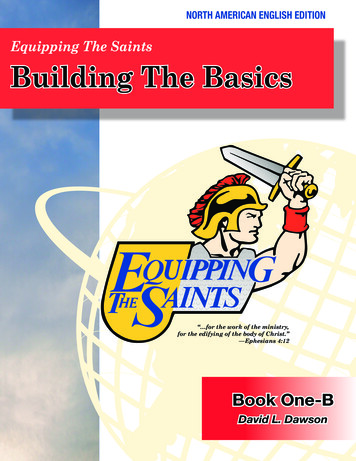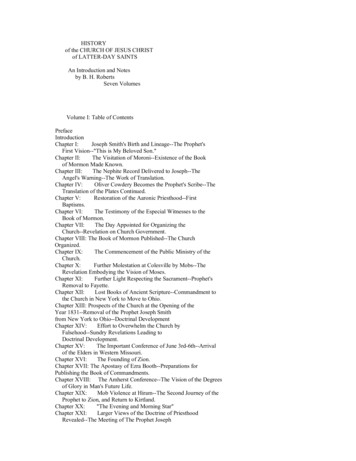
Transcription
HISTORYof the CHURCH OF JESUS CHRISTof LATTER-DAY SAINTSAn Introduction and Notesby B. H. RobertsSeven VolumesVolume I: Table of ContentsPrefaceIntroductionChapter I:Joseph Smith's Birth and Lineage--The Prophet'sFirst Vision--"This is My Beloved Son."Chapter II:The Visitation of Moroni--Existence of the Bookof Mormon Made Known.Chapter III:The Nephite Record Delivered to Joseph--TheAngel's Warning--The Work of Translation.Chapter IV:Oliver Cowdery Becomes the Prophet's Scribe--TheTranslation of the Plates Continued.Chapter V:Restoration of the Aaronic Priesthood--FirstBaptisms.Chapter VI:The Testimony of the Especial Witnesses to theBook of Mormon.Chapter VII:The Day Appointed for Organizing theChurch--Revelation on Church Government.Chapter VIII: The Book of Mormon Published--The ChurchOrganized.Chapter IX:The Commencement of the Public Ministry of theChurch.Chapter X:Further Molestation at Colesville by Mobs--TheRevelation Embodying the Vision of Moses.Chapter XI:Further Light Respecting the Sacrament--Prophet'sRemoval to Fayette.Chapter XII:Lost Books of Ancient Scripture--Commandment tothe Church in New York to Move to Ohio.Chapter XIII: Prospects of the Church at the Opening of theYear 1831--Removal of the Prophet Joseph Smithfrom New York to Ohio--Doctrinal DevelopmentChapter XIV:Effort to Overwhelm the Church byFalsehood--Sundry Revelations Leading toDoctrinal Development.Chapter XV:The Important Conference of June 3rd-6th--Arrivalof the Elders in Western Missouri.Chapter XVI:The Founding of Zion.Chapter XVII: The Apostasy of Ezra Booth--Preparations forPublishing the Book of Commandments.Chapter XVIII: The Amherst Conference--The Vision of the Degreesof Glory in Man's Future Life.Chapter XIX:Mob Violence at Hiram--The Second Journey of theProphet to Zion, and Return to Kirtland.Chapter XX:"The Evening and Morning Star"Chapter XXI:Larger Views of the Doctrine of PriesthoodRevealed--The Meeting of The Prophet Joseph
Smith, Jun., Brigham Young, and Heber C. Kimball.Chapter XXII: The Prophecy on the War of the Rebellion--TheOlive Leaf--Communication to Mr. Seaton--Warningto Zion.Chapter XXIII: The Enjoyment of Spiritual Blessings in theChurch--The Word of Wisdom.Chapter XXIV: Kirtland to be a Stake of Zion--Regulation ofChurch Affairs in MissouriChapter XXV:Preparations for Building the KirtlandTemple--Trial and Excommunication of "Doctor"Philastus Hurlburt.Chapter XXVI: The Plat of the City of Zion--ItsTemples--Correspondence on Affairs in Zion andEugene.Chapter XXVII: Preparation of the Mob in Jackson County toResort to Violence--Important Excerpts from the"Star."Chapter XXVIII: Mob Violence in the Land of Zion.Chapter XXIX: Minor Events in Zion and Kirtland--An Appeal tothe Governor of Missouri.Chapter XXX:The Prophet's Mission to Canada.Chapter XXXI: Expulsion of the Saints from Jackson County.Chapter XXXII: Remembrance of Canada Saints--Correspondence andPetition Relative to Missouri Affairs.Chapter XXXIII: The Prophet's Sympathy for the ExiledSaints--Reasons for Their Expulsion from Zion.Chapter XXXIV: A Press Established at Kirtland--Blessing Uponthe Prophet's Family--Responsibility for LawlessActs in Missouri.Chapter XXXV: Important Correspondence on Jackson CountyAffairs, Chiefly Between Leading Officials of theChurch in Zion and State Officials ofMissouri.HISTORY OF THE CHURCH OF JESUS CHRIST OF LATTER-DAY SAINTSPeriod I.History of Joseph Smith, the Prophet by HimselfAn Introduction and Notes by B. H. RobertsPREFACE.In publishing the HISTORY OF THE CHURCH OF JESUS CHRIST OF LATTER-DAYSAINTS, it is felt that a solemn duty is being performed to the Saints andto the world. The events which make up the history of the Church in thisage are the most important that history can chronicle. It is duetherefore both to the Saints themselves and to the world that a faithfuland complete history of the facts in which the Church of Jesus Christ ofLatter-day Saints had its origin, together with the events through whichit was subsequently developed, and all the circumstances, experiences andtrials through which it passed be made known to mankind. It is important,too, that so far as possible the events which make up the history be
related by the persons who witnessed them, since such statements give thereader testimony of the facts at first hand; and there is placed on recordat the same time the highest order of historical evidence of the truth ofwhat is stated. It was these considerations which induced the Churchauthorities, under whose auspices this history is published, to take thenarrative of the Prophet Joseph Smith, as found in the manuscript Historyof the Church--now in the archives of the Historian's office--for the bodyof the work, rather than to authorize the writing of a history in theordinary way. The editors of the work are not oblivious to the fact thatto proceed in the manner followed in these volumes has its disadvantages;that it renders it impossible to correlate the facts, and give unity tothe work; that it makes the body of the work more of the nature of annalsthan of history; with the accompanying result that the conclusion of anevent, or even a series of events, is frequently postponed indefinitely,and each reader is left to be his own "philosopher of history" whileperusing these pages; that is, to form his own conclusions upon the datahere presented to him. To overcome, at least in some small degree, theobvious disadvantages of the style in which it has been determined topublish this history, marginal notes relating to important matters aregiven, which, while it is not claimed that they overcome the difficultiesof the annalistic style of the main body of the work, will nevertheless,be of great service to the reader both in this respect and also in hereand there enlarging upon the Prophet's narrative where that narrative doesnot include all the facts known upon the subject.From the first the Prophet Joseph Smith had a clear apprehension ofthe importance of keeping a faithful record of the events connected withthe great work which God was bringing forth through his instrumentality;and it is to his appreciation of the importance of that fact, and hisnever tiring energy respecting it, that we are indebted for the minutecompleteness of our Church annals. While the very rapidity with whichevents happened, together with the quickly changing circumstances throughwhich the purposes of God were unfolded in the great Dispensation of thefulness of Times, necessarily occupied the time of the Prophet, and wellnigh made it impossible for him to give all the attention to the making ofannals that is necessary to such work, still he quite thoroughlysupervised the writing of his history, with the result that more completehistorical data have been written and preserved respecting the comingforth of the work of God in these last days than any other great movementwhatsoever.One difficulty the Prophet experienced in writing the annals of theChurch, which he usually called his history, was the unfaithfulness ofsome whom he employed in this service, and the frequent change ofhistorians, owing to the ever shifting conditions surrounding the Churchin the early years of its existence. It would be marvelous indeed ifunder all these circumstances there had been no mistakes made in ourannals, no conflict of dates, no errors in the relation of events. Butwhether these conditions are taken into account or not, the manuscriptannals of the Church are astonishingly free from errors of dates, relationof facts, or anachronisms of every description. When the Churchhistorians George A. Smith and Wilford Woodruff completed theirpublication of the History of Joseph Smith, down to the 8th of August,1844, which history was published in installments in the Deseret News,Utah, and in the Millennial Star, England, they expressed themselves uponthe correctness of what they had published in the following manner:"The History of Joseph Smith is now before the world, and we are
satisfied that a history more correct in its details than this was neverpublished. To have it strictly correct, the greatest possible pains havebeen taken by the historians and clerks engaged in the work. They wereeye and ear witnesses of nearly all the transactions recorded in thishistory, most of which were reported as they transpired, and, where theywere not personally present, they have had access to those who were.Moreover, since the death of the Prophet Joseph, the history has beencarefully revised under the strict inspection of President Brigham Young,and approved by him, We, therefore, hereby bear our testimony to all theworld, unto whom these words shall come, that the History of Joseph Smithis true, and is one of the most authentic histories ever written."Their statement assuredly is true; and yet by a careful revision ofthe work they did, and the correction of a few errors in dates and otherdetails, the work has been brought to a still higher state of perfection.Where grammatical accuracy was violated in the original record it has beencorrected, so far as observed; but no historical or doctrinal statementhas been changed. Some changes will be observed in the matter of thebiographies of the leading elders of the early days of the Church. When aman of prominence connected himself with the Church, the Prophet Josephusually gave a biographical sketch of him in his own history, thenwriting; and sometimes these biographies were long and unduly interruptedthe movement of events. To rid the body of the work of this incumbranceit was decided to place all biographical matter in marginal notes; thismade it necessary to condense very much those found in the Prophet'snarrative, while severe brevity--after accuracy--has been the aim in thoseprepared by the annotator.The most careful attention has been given to this work by thoseengaged in its preparation. The manuscript has been read to the ChurchHistorian, President Anthon H. Lund, with constant reference to theoriginal manuscript history and all copies of it published in the Timesand Seasons and the Millennial Star; and also to various editions of theDoctrine and Covenants, and the Book of Commandments published atIndependence, Missouri, in 1833, where the revelations received by theProphet Joseph Smith are contained. In the course of this work slightvariations in phraseology were discovered in the several editions of theDoctrine and Covenants, that doubtless arose through careless proofreading; and as between the most carefully proof-read editions and therevelations found in the manuscript History of the Church there were someslight differences, which were corrected to agree with the originalmanuscript; but the corrections were never made until first submitted tothe First Presidency, and carefully considered and approved by them. Wetherefore feel that this great care has resulted in presenting to theChurch and to the world the revelations which the Prophet Joseph Smithreceived in their most perfect form; and that a standard is created forall future publication of these revelations. Speaking of the revelationsthat appear in this book, it is proper to remark that one of the chiefvalues of this volume of the History of the Church will arise from thefact that the greater number of those revelations received by the ProphetJoseph Smith is published in it--one hundred and one, out of a hundred andthirty-three found in the Doctrine and Covenants; and as they arepublished in connection with the circumstances existing when broughtforth, the student of the doctrines of the Church will find this volume ofalmost incalculable benefit to him.In the Introduction it is believed the reader will find a fittingbackground from which are projected with majestic boldness the great
events and splendid doctrines of the Dispensation of the Fulness of Times.That dispensation, of which this history is but the chronicle, bears animportant relation to all former dispensations since the world began. Itis the ocean into which they as streams flow. It is their complement, andunifying force--it makes them all one; and demonstrates that while thingsto men appear but in parts, God forever stands in the presence of thewhole, and dispenses His providences with reference to His perfectcomprehension of the end from the beginning. It is to exhibit thisrelation of dispensations that the Introduction is written, and theimportance of the subject must be the apology for its length.INTRODUCTIONANTIQUITY OF THE GOSPELTHE HISTORY OF THE CHURCH OF JESUS CHRIST OF LATTER-DAY SAINTS isalso the history of the opening and progress of the Dispensation of theFulness of Times; and as that dispensation bears an important relation toall dispensations which have preceded it, let us here ascertain in whatthat relation consists. By doing so we shall have a better appreciationof the full import of those events which make up the history of theChurch.A dispensation, without reference to any specific application orlimitation of the term, is the act of dealing out or distributing, such asthe dispensation of justice by courts, the dispensation of blessings orafflictions by the hand of Providence. Theologically a dispensation isdefined as one of the several systems or bodies of law in which atdifferent periods God has revealed his mind and will to man, such as thePatriarchal Dispensation, the Mosaic Dispensation, or the ChristianDispensation. The word is also sometimes applied to the periods of timeduring which the said laws obtain. That is, the period from Adam to Noahis usually called the Patriarchal Dispensation. From Noah to the callingof Abraham, the Noachian Dispensation; and from Abraham to the calling ofMoses, the Abrahamic Dispensation. But the word dispensation as connectedwith the Gospel of Jesus Christ means the opening of the heavens to men;the giving out or dispensing to them the word of God; the revealing to menin whole or the part the principles and ordinances of the Gospel; theconferring of divine authority upon certain chosen ones, by which they areempowered to act in the name, that is, in the authority of God, and forHim. That is a dispensation as relating to the Gospel; and theDispensation of the Fulness of Times is the dispensation which includesall others and gathers to itself all things which bear any relationwhatsoever to the work of God. Also it is the last dispensation, the onein which will be gathered together in one all things in Christ, both whichare in heaven, and which are on earth; even in Him. It is thedispensation which will see fulfilled all the decrees of God respectingthe salvation of men and the redemption of the earth itself; and bearssuch relation to all other dispensations of the Gospel as the ocean doesto all earth's streams. It receives and unites them all in itself.That there have been many dispensations of the Gospel, many timesthat divine authority has been conferred upon men, is apparent from theScripture narrative of such events. And yet, strange as it may seem, inthe face of such Scripture narratives, there are those among professingChristians who hold that the Gospel had no earlier origin than the time ofMessiah's ministry in the flesh. As a matter of fact, however, the Gospel
of Jesus Christ has existed from the very earliest ages of the world.There are, indeed, certain passages of Scripture which lead us to believethat even before the earth was made or ever man was placed upon it, theGospel had been formulated and was understood by the spirits whichinhabited the kingdom of the Father; and who, in course of time, would beblessed with a probation on the earth--an earth-life. If this be nottrue, of what significance is the Scripture which speaks of Jesus as theLamb ordained before the foundation of the world, but revealed in this dayfor the salvation of man? What of the "Lamb slain from the foundation ofthe world"? And further: "They that dwell on the earth shall wonder,whose names were not written in the Book of Life from the foundation ofthe world." "Where wast thou," asked the Lord of Job, "when I laid thefoundations of the earth? * * * When the morning stars sang together, andall the sons of God shouted for joy?" There is evidence in theseexpressions found in Scripture that before the foundations of the earthwere laid the sacrifice necessary to the redemption of men was understood,and the "Lamb" for the sacrifice was chosen, Jesus, the Messiah. There isevidence in these expressions from Scripture of the pre-existence of thespirits of men, and the names of some of them at least were written in the"Book of Life" from the foundation of the world, and it is not unlikelythat the shouting of all the sons of God for joy at the creation of theearth was in consequence of the prospects which opened before them becauseof the earth-life and the salvation that would come to them through theGospel--even in the prospects of that "eternal life, which God that cannotlie promised before the world began."The Gospel Revealed to Adam.The Gospel, then, is of great antiquity. Older than the hills, olderthan the earth; for in the heavenly kingdom was it formulated before thefoundations of the earth were laid. Nor were men left in ignorance of theplan of their redemption until the coming of the Messiah in the flesh.From the first that plan was known. Our annals are imperfect on thathead, doubtless, but enough exists even in the Jewish scriptures toindicate the existence of a knowledge of the fact of the Atonement and ofthe redemption of man through that means. Abel, the son of Adam, is thefirst we read of in the Jewish scriptures as offering "the firstlings ofhis flock" as a sacrifice unto God. How came he to offer sacrifice of thefirstlings of his flock? Doubtless behind Abel's sacrifice, as behindsimilar offerings in subsequent ages, stood the fact of the Christ'sAtonement. In it was figured forth the means of man'sredemption--through a sacrifice, and that the sacrifice of the first-born.But where learned Abel to offer sacrifice if not from his father Adam? Itis reasonably certain that Adam as well as Abel offered sacrifices, inlike manner and for the same intent; and to Adam, though the Jewishscriptures are silent respecting it, God must have revealed both thenecessity of offering sacrifice and the great thing of which it was butthe symbol. And here, to some advantage, may be quoted a passage from thewritings of Moses, as revealed to Joseph Smith, in December, 1830. Fromwhat was then made known to the great latter-day Prophet of the writingsof Moses, it appears that our book of Genesis does not contain all thatwas revealed to Moses respecting the revelations of God to Adam and hischildren of the first generation. According to this more complete accountof the revelation to Moses, after Adam was driven from Eden, God gavecommandments both to him and his wife, that they should worship the Lordtheir God, and should offer the firstlings of their flocks for an offeringunto the Lord, and Adam was obedient unto the commandment:
And after many days an angel of the Lord appeared unto Adam,saying: Why doest thou offer sacrifices unto the Lord; And Adam saidunto him: I know not, save the Lord commanded me. And the angelspake, saying; This thing is a similitude of the sacrifice of theOnly Begotten of the Father, which is full of grace and truth.Wherefore, thou shalt do all that thou doest in the name of the Son,and thou shalt repent and call upon God in the name of the Sonforevermore.After some time elapsed and men multiplied in the earth andwickedness increased; after Abel, the righteous, was slain and Cain was avagabond in the earth for the murder; after Lamech had also become amurderer and Satan had great power among the disobedient--then, it iswritten:And God cursed the earth with a sore curse, and was angry with thewicked, with all the sons of men whom he had made; for they would nothearken unto His voice, nor believe on His Only Begotten son, evenHim whom He declared should come in the meridian of time, who wasprepared from before the foundation of the world. And thus theGospel began to be preached, from the beginning, being declared byholy angels sent forth from the presence of God, and by His ownvoice, and by the gift of the Holy Ghost. And thus all things wereconfirmed unto Adam, by an holy ordinance, and the Gospel preached,and a decree sent forth, that it should be in the world, until theend thereof.Establishment of the Ancient Church.As the Gospel was thus preached there were those among the childrenof Adam who obeyed it, and a record of those men was kept, and theyconstituted the ancient Church of God. Enoch was of the number ofrighteous ones, and a preacher of righteousness. In these revealedwritings of Moses he is represented in the course of his ministry asreferring to the manner in which the Gospel was taught to Adam:And he said unto them: Because that Adam fell, we are, and by hisfall came death; and we are made partakers of misery and woe. BeholdSatan hath come among the children of men, and tempteth them toworship him; and men have become carnal, sensual, and devilish, andare shut out from the presence of God. But God hath made known untoour fathers that all men must repent. And He called upon our fatherAdam by His own voice, saying: I am God; I made the world, and menbefore they were in the flesh. And He also said unto him: If thouwilt turn unto me, and hearken unto my voice, and believe, and repentof all thy transgressions, and be baptized, even in water, in thename of mine Only Begotten son, who is full of grace and truth, whichis Jesus Christ, the only name which shall be given under heaven,whereby salvation shall come unto the children of men, ye shallreceive the gift of the Holy Ghost, asking all things in His name,and whatsoever ye shall ask, it shall be given you.Adam was obedient to the commandments of the Lord, and taught them tohis children, many of whom believed them, obeyed, and became the sons ofGod.Enoch, we are told, "walked with God: and he was not; for God tookhim." Paul, in speaking of him, says: "By faith Enoch was translated
that he should not see death; and was not found, because God hadtranslated him." But the writings of Moses, as revealed to Joseph Smith,and from which I have been quoting, give information that not only wasEnoch translated but the Saints inhabiting his city, into which he hadgathered his people, and this city was called Zion; "And it came to passthat Zion was not, for God received it up into His own bosom; and fromthence went forth the saying, Zion is fled."The Gospel versus the Law.Thus the Gospel was taught to the ancients. Noah was a preacher ofit as well as Enoch. So, too, was Melchizedek, priest of the Most HighGod, King of Salem, who met Abraham in his day and blessed him. Paul,the Apostle of the Gentiles, bears unmistakable testimony to the fact thatthe Gospel was preached unto Abraham; and also that it was offered toIsrael under Moses before "the law of carnal commandments" was given. "Iwould not that ye should be ignorant," he says, "how that all our fatherswere under the cloud, and all passed through the sea; and were allbaptized unto Moses in the cloud and in the sea; and did all eat the samespiritual meat; and did all drink the same spiritual drink: for they drankof that spiritual Rock that followed them; and that Rock was Christ."Referring again to the fact of the presentation of the Gospel toancient Israel, Paul says that the Gospel was preached unto ancientIsrael, as well as unto Israel in his day; but the preaching of the Gospelto ancient Israel was not profitable to them, because they received it notin faith, and as a result displeased God by their unbelief, and therebellious perished in the wilderness.Paul's great controversy with the Christian Jews was in relation tothe superiority of the Gospel to the law of Moses. Many of the ChristianJews while accepting Jesus of Nazareth as the promised Messiah, still heldto the law with something like superstitious reverence, and could not bepersuaded that the Gospel superseded the law, and was, in fact, afulfillment of all its types and symbols. This controversy culminated inPaul's now celebrated letter to the Galatians, wherein he says:Know ye therefore that they which are of faith, the same are thechildren of Abraham. And the scripture, foreseeing that God wouldjustify the heathen through faith, preached before the Gospel untoAbraham, saying, in thee shall all nations be blessed. * * * * Nowto Abraham and his seed were the promises made. He saith not, And toseeds, as of many: but as of one. And to thy seed, which is Christ.And this I say, that the covenant, that was confirmed before of Godin Christ, the law, which was four hundred and thirty years after,cannot disannul, that it should make the promise of none effect. * ** * Wherefore then serveth the law? It was added because oftransgressions, till the seed should come to whom the promise wasmade; and it was ordained by angels in the hand of a mediator. * * *Wherefore the law was our schoolmaster to bring us unto Christ, thatwe might be justified by faith. But after that faith is come, we areno longer under a schoolmaster. For ye are all the children of Godby faith in Christ Jesus.From Moses to John the Baptist and MessiahIn greater clearness, however, than in these sayings of Paul gatheredup from his writings like scattered rays of light from a prism's
reflection, the antiquity of the Gospel, as far as it concerns ancientIsrael, is stated in a revelation of God to the Prophet Joseph Smith. Andnot only the antiquity of the Gospel, but in greater clearness also isstated the reasons why, after the Gospel was first preached to ancientIsrael, the law of carnal commandments was "added" to the Gospel, or givenin its place, to act as a schoolmaster to bring Israel unto Christ. Andby the knowledge imparted in that revelation the time between the Mosaicdispensation and the coming of John the Baptist, to prepare the way forthe coming of the Christ, is spanned by a statement so rational, that thetruth of it cannot be reasonably questioned.Speaking of the Melchizedek Priesthood and its powers inadministering the ordinances of the Gospel, and how it came to disappearas an organization in Israel, the passage in question says:This greater Priesthood administereth the Gospel and holdeth thekey of the mysteries of the kingdom, even the key of the knowledge ofGod. Therefore, in the ordinances thereof, the power of godliness ismanifest. And without the ordinances thereof, and the authority ofthe Priesthood, the power of godliness is not manifest unto men inthe flesh: for without this no man can see the face of God, even theFather, and live. Now this Moses plainly taught to the children ofIsrael in the wilderness and sought diligently to sanctify his peoplethat they might behold the face of God; but they hardened theirhearts and could not endure his presence; therefore, the Lord in hiswrath, for his anger was kindled against them, swore that they shouldnot enter into his rest while in the wilderness, which rest is thefulness of his glory. Therefore he took Moses out of their midst,and the Holy Priesthood also; and the lesser Priesthood continued,which Priesthood holdeth the key of the ministering of angels and thepreparatory Gospel; which Gospel is the Gospel of repentance and ofbaptism, and the remission of sins, and the law of carnalcommandments, which the Lord in his wrath, caused to continue withthe house of Aaron among the children of Israel until John, whom Godraised up, being filled with the Holy Ghost from his mother's womb;for he was baptized while he was yet in his childhood, and wasordained by the angel of God at the when he was eight days old untothis power to overthrow the kingdom of the Jews, and to make straightthe way of the Lord before the fate of his people, to prepare themfor the coming of the Lord, in whose hand is given all power.As before remarked, this passage spans the interval of time betweenMoses and John the Baptist, and gives a fuller explanation than can befound in the writings of Paul or elsewhere, for the reason why and in whatmanner the law supplanted the Gospel; and what measure of the Priesthoodremained with Israel unto the coming of John; in what the mission of Johnconsisted, and in what manner he was qualified to fulfil that mission.It should be remarked, however, that while the Lord took Moses out ofthe midst of ancient Israel, and the Holy Melchizedek Priesthood also, asan institution, as an organization, it is evident that subsequentlyspecial dispensations of that Priesthood were given to individualprophets, such as Samuel, Nathan, Elijah, Isaiah, Jeremiah, Ezekiel, andDaniel: for these men exercised powers and enjoyed privileges whichbelong exclusively to the Melchizedek Priesthood.The Dispensation of the Meridian of Time.
With the period between Moses and John the Baptist spanned, we cometo the Dispensation of the Meridian of Time. This dispensation beginswith the preaching of John the Baptist in the wilderness. It was madeglorious by the personal ministry of Jesus of Nazareth, the Son of God; byHis suffering and death, for the redemption of mankind; by His gloriousresurrection from the dead; by His subsequent ministry among Hisfollowers, and His final ascension into heaven to the throne of HisFather; by the faithful ministry of His Apostles, by whom the good tidingsof man's salvation were published to the world: by the establishment ofthe Church as the agency through which the Gospel was to be more widelyproclaimed, and those who accepted the Gospel were more thoroughlyinstructed in its doctrines, guarded from error, and finally perfected inthe Christian life. An inspired volume of Scripture, the New Testament,was also brought into existence, from the teachings of the inspiredApostles, in which the great fundamental truths of the Gospel wer
of LATTER-DAY SAINTS An Introduction and Notes by B. H. Roberts Seven Volumes Volume I: Table of Contents Preface Introduction Chapter I: Joseph Smith's Birth and Lineage--The Prophet's First Vision--"This is My Beloved Son." Chapter II: The Visitation of Moroni--Exi

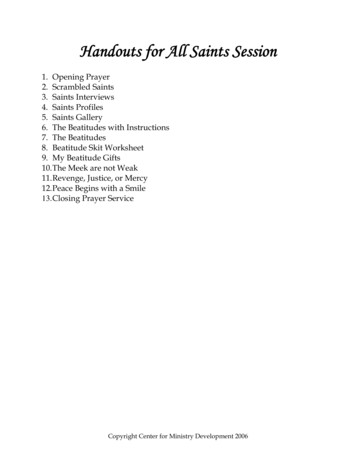
![Welcome [dashdiet.me]](/img/17/30-day-weight-loss-journal.jpg)
